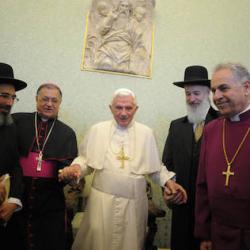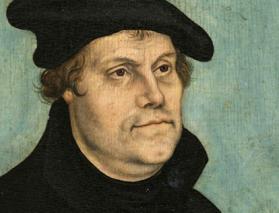My End of Protestantism (the book) deals with a number of the questions Doug Wilson raises in his rejoinder. I’m sure Doug will have more to say if he reads the book, and I’ll try to respond then. Here I limit myself to a few notes. I state a clarification, highlight an irony, expose a rhetorical misdirection, point to Doug’s leading error, and close, in good revivalist fashion, with an invitation.
The clarification: I do recognize the gargantuan import my proposal has for Roman Catholicism and Orthodoxy, but I’m a Protestant speaking to Protestants. My proposal, in any case, has gargantuan import for Protestants too. If we are to achieve the unity Jesus desires, Protestants will have to give up something essential to our identity—our self-definition over against Roman Catholicism and Orthodoxy.
The irony: Doug claims that I’m impatient because I urge people to strive for a sort of unity that will only be realized in the future. But Doug is postmillennial. He believes that the nations will be converted and Christianized and cultures will be transformed by the gospel. He doesn’t passively wait around for it to happen. He’s founded schools, churches, a publishing house; he writes books, debates, preaches, blogs, who knows what all. Holiness is as much an eschatological note of the church as unity and catholicity, but as a pastor Doug (impatiently?) strives to make the church holy now. If he’s zealous for holiness now, why be a quietist concerning catholicity and unity? Doug is a living refutation of the logic he applies to me.
The misdirection: Doug says that I’m offering Anglo-Catholicism with all the frilly frills, all its surplices and genuflections, its coquettish flirtations with Rome. Doug is refuting an argument I never made. I urge reforms for Protestantism because I’m Protestant, because at a number of points Protestantism doesn’t measure up to Scripture, or, for that matter, to the Reformation. Nothing in the article he cites, or in my book, is distinctively Anglo-Catholic. “Anglo-Catholic” is an effort to refute by labeling, a scare word designed to convince readers that I’m not to be trusted.
The error: Doug’s theological error is the way he distinguishes “institutional” unity (Doug’s word, not mine or Paul’s), which is eschatological, with the sort of unity that is inherent in the church’s being the church. “Institutional” is another scare word. It’s the kind of unity that Anglo-Catholics or Roman Catholics want. It’s an un-Protestant sort of unity.
With Doug, I delight in the forms of communion and cooperation that Christians enjoy in our current denominational system. But the church isn’t a collection of individuals, and the unity we confess isn’t just the unity that a Catholic enjoys over lunch with a Methodist. The church is a society, and the unity we confess is a corporate unity.
As a practical matter, no human society can be unified without institutional features. Human beings are bodies in time, and we need order, pattern, structures of authority if we are going to live together at all. Local churches are unified institutionally, as are denominations. When denominations commune and cooperate as denominations, that can’t help but take institutional form.
There’s a pneumatological point here. The Spirit gives gifts to the church, human beings equipped with abilities to be used for the common good of the whole body. Among these gifts are gifts of leadership and administration. A Spirit-filled, Spirit-unified church crystallizes in institutional patterns and forms. Spiritual unity includes institutional unity.
Finally, the invitation: By Doug’s own ecclesiology, we’re already one. There is only one plane, though (following Lewis, a real Anglican) some of us are in economy, some in business, and some in first class. (I’m hoping they gave me the extra leg room I paid for.) Whether he likes it or not, Doug and I are flying together, and Jesus is taking us to the same destination. It’s a destination Doug knows because he confesses it every week—a church that is one, holy, catholic, and apostolic.
Buckle up, relax, and enjoy the ride.
(An earlier version of this post stated that Lewis was Anglo-Catholic.)











